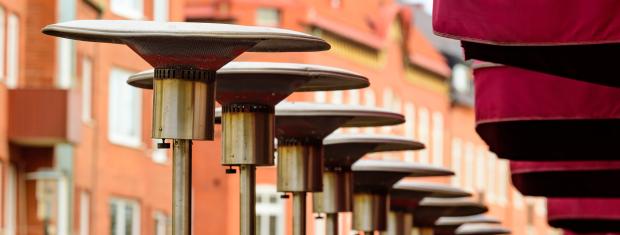
Winter Risks: Using Space Heaters for Outdoor Seating
As restaurants around America brave through the COVID-19 pandemic, some have begun making innovative changes to continue business operations. With capacity limitations and indoor dining prohibited in some locales, restaurants are utilizing outdoor spaces and tents now more than ever before.
Outdoor seating allows for a safer amount of ventilation for their customers. This adjustment has helped many establishments stay afloat. However, with the cold winter months upon us, is outdoor seating still practical?
It can be. Nearly half of all full-service restaurants (49%) say they will take actions to extend outdoor dining, including adding tents and patio heaters. Encouraging customers to bundle up and making an effort to provide a comfortable dining experience may not be ideal, but restaurants will likely do whatever they can to make ends meet until spring.
Patio Heater Safety Concerns
Understanding how to use patio heaters and open flame appliances appropriately is key to creating a safe and enjoyable outdoor dining experience. The two largest threats to consider when incorporating patio heaters into your restaurant’s outdoor space are carbon monoxide poisoning and fire.
Carbon Monoxide Exposure
Carbon monoxide poisoning can happen within a matter of minutes. This odorless, colorless poison can cause harm at low levels, cause permanent neurological dysfunctions at moderate levels, and can take lives at high levels. Oil, propane, and natural gas-fired heating systems release carbon monoxide as they burn and can create significant health hazards. Adequate ventilation is the best defense against the risk of carbon monoxide poisoning.
How to Test Propane Cylinders for Leaks
Once fuel cylinders are installed, they should always be tested for leaks. Apply a 50/50 solution of water and dish soap to all propane cylinder connections and hoses. If bubbles appear, gas may be leaking. If so, you should tighten the connection and retest. If bubbles continue to appear, contact a certified technician to repair or replace the damaged parts before using the unit.
Fire Hazards
As with any ignition source, propane heaters should be carefully located to avoid any potential fire hazards. Install heaters according to the manufacturer’s instructions regarding ceiling height clearance, proper distancing from fire hazards, building openings, and mechanical air intakes.
Fire hazards may present themselves around, above or underneath the heating unit itself. Identify any combustible materials that may create a hazard such as tablecloths, awnings, umbrellas, paper products, decorations, etc. Ensure heaters stay clear of these items.
Educating Employees on Safe Operating Practices
All members of your staff should be familiarized with the safe operation of patio heaters, including how to:
- Identify hazards – fire and carbon monoxide poisoning.
- Safely light, turn off and move heaters.
- Safely connect, disconnect, move, transport and store propane cylinders.
- Detect leaks in fittings, hoses and valves.
- Prepare equipment for inclement weather.
- Properly respond to emergencies such as locating nearby fire extinguishers and recognizing symptoms of carbon monoxide poisoning (dizziness, nausea, headache).
General Patio Heater Safety Do’s and Dont’s
DO:
- Use patio heaters designed for outdoor use only outdoors.
- Do store propane cylinders upright outdoors within a safeguarded tamper-proof, vehicle-proof area, such as a fenced-in area or a locked cage.
- Do ensure heaters are on a stable surface so they don’t get knocked over.
- Do use caution when moving propane cylinders to avoid dropping or impact.
- Do locate sufficient, easily accessible, fire extinguishers in the patio area.
- Do make sure your equipment is certified by the CSA/ULC or other recognized testing laboratories and meets the requirements of TSSA Act 2000.
DON’T:
- Never use patio heaters indoors or within an enclosed structure.
- Don’t store propane cylinders indoors.
- Don’t install heaters on grass, near the edge of an elevated platform, or on an uneven sidewalk.
- Don’t position patio heaters next to or in the path of an exit or fire escape.
- Never move portable heaters while the flame is lit. Ensure the fuel supply is shut off properly and the unit has cooled before relocating.
- Never leave patio heaters unattended.


